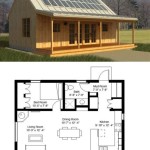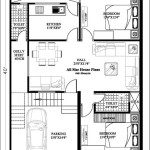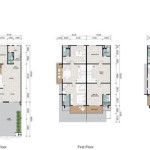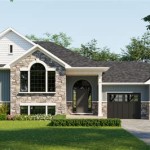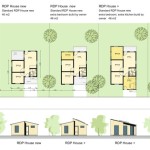Roofline: A Distinctive Aspect of House Plan Design
When conceptualizing a house plan, the roofline holds significant importance, extending beyond mere aesthetics. It plays a crucial role in defining the overall character, functionality, and curb appeal of the home. Here are a few essential aspects to consider when exploring the roofline for your dream house:
Pitch and Slope
The angle of the roof, known as the pitch, influences the home's appearance and functionality. A steep pitch sheds water efficiently, making it suitable for areas with heavy rainfall. Conversely, a low pitch offers a more contemporary look and can accommodate modern architectural styles. Moreover, the slope of the roof determines the available attic space, with steeper roofs providing more headroom.
Roofing Materials
The choice of roofing material is dictated by factors such as durability, aesthetic appeal, and regional climate. Asphalt shingles remain popular for their affordability and ease of installation. Metal roofing offers exceptional longevity and resistance to fire and hail damage. Tile roofing, although pricier, adds a touch of elegance and can withstand extreme weather conditions.
Roof Shapes
Roof shapes vary widely, each with its unique characteristics. Gable roofs feature two sloping sides meeting at a ridge, exuding classic charm. Hipped roofs have four sloping sides meeting at a central point, providing stability in high-wind areas. Shed roofs have a single, sloping plane, offering a modern and minimalist aesthetic. Flat roofs, although less common in residential architecture, can accommodate rooftop terraces or gardens.
Rooflines and Architectural Style
The roofline plays a vital role in defining the architectural style of a house. Victorian homes often feature intricate rooflines with multiple peaks and dormers. Contemporary homes embrace clean lines and simple roof shapes. Farmhouse-style homes typically have gable roofs with wide overhangs, evoking a rustic charm. The choice of roofline should complement the desired architectural style of the home.
Dormer Windows
Dormers extend outwards from the roof plane, adding vertical space to the attic and providing natural light. They come in various shapes and sizes, including gabled, eyebrow, and shed dormers. Dormers can improve ventilation, create cozy nooks, and enhance the aesthetic appeal of the home.
Gutters and Downspouts
Gutters and downspouts are essential for directing rainwater away from the roof and foundation. Proper guttering prevents water damage to walls, soffits, and landscaping. They should be sized appropriately to handle the volume of rainwater and installed with the correct slope to ensure efficient drainage.
Conclusion
The roofline is a defining element of any house plan, influencing its appearance, functionality, and structural integrity. By carefully considering the pitch, roofing materials, roof shapes, and architectural style, you can create a roofline that complements the overall design of your dream home. Remember to consult with an experienced architect or designer to ensure that your roofline meets both your aesthetic and practical requirements.

3 Bed Home Plan With Simple Roofline And 2 Car Garage 25025dh Architectural Designs House Plans

Stylish And Functional One Level Prairie Style House Plan

Modern Houseplan 76346 A Simple Roofline Architectural Entry Accent And Mod Moder Style House Plans Beautiful Bungalow

4 Or 5 Bed House Plan With Swooping Roof Line 710182btz Architectural Designs Plans

Willow Lane House Plan 1664 Square Feet Gable Roof Option

Plan 83511 Barndominium With Simple Roofline

Modern Ranch Home Plan With Dynamic Roofline Architectural Designs 62815dj House Plans

One Story 3 Bed House Plan With Clipped Roofline

How To Modify The Almost Perfect House Plan America S Best Plans Blog

Unique Contemporary Style House Plan 7565 Urban

